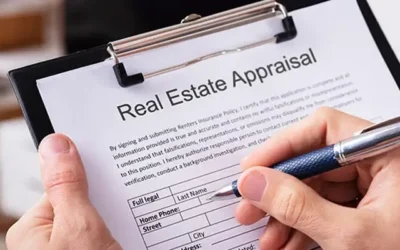
VA Home Appraisals: Value and MPR Checks
A VA appraisal is required for most VA purchase loans and it covers two things, fair market value and Minimum Property Requirements. The appraiser is independent and assigned through the VA system. The goal is not perfection, it is a home that is safe, structurally sound, and sanitary, with a value that supports the contract price.
MPRs focus on safe, sound, sanitary
- Utilities and heat must work: The home needs reliable electricity, water, and a permanent heat source that can maintain livable indoor conditions, since basic habitability is a core VA requirement.
- Roof and structure must have life left: The VA looks for reasonable future utility, so major roof failure, active leaks, severe foundation movement, or unsafe crawl space moisture issues can trigger repairs.
- Obvious safety hazards are flags: Missing handrails, exposed wiring, broken windows, or other clear hazards can require correction, because the VA does not want Veterans buying a property with preventable risks.
- Lead based paint rules matter: For homes built before 1978, peeling or chipping paint commonly requires repair, since it can be treated as a health hazard under VA safety standards.
Fees and timelines depend on your area
- Fees are capped by the VA: The VA publishes maximum allowable appraisal fees by region and property type. Your actual fee is usually at or under that cap, based on your location and complexity.
- Timeliness targets are published: The VA also sets completion day requirements by region. Many areas move quickly, but rural or high demand markets can take longer when appraiser availability is tight.
- Repairs can add a second step: If the appraisal is made subject to repairs, a final inspection is often required to confirm the work is complete before closing can move forward.
- Plan buffer days in your contract: The smartest way to avoid panic is building an appraisal and repair buffer into your timeline so you are not forced into rushed decisions.
If value comes in low, use VA tools
- Tidewater gives you a short window: When the appraiser believes the value may fall short, Tidewater can open a two business day window for your lender and agent to submit stronger comparable sales and support.
- ROV is the formal challenge path: If the final Notice of Value still comes in low, you can request a Reconsideration of Value through your lender with better comps and clear market evidence.
- Renegotiate is often the fastest fix: Many deals close by renegotiating price to the appraised value, especially when the comps are clear and both parties want the transaction to survive.
- Cash gap is a last resort: Paying the difference is allowed in some cases, but it should be a deliberate choice, not a reflex, since it changes your equity position and your real return.
Appraisal is not the same as inspection
- Appraisal protects loan viability: A VA appraisal checks value and baseline safety. It is not a deep evaluation of every system, and it is not designed to forecast future repair costs.
- Inspection protects your wallet: A professional inspection reviews HVAC, plumbing, roof condition, attic, drainage, and other details that can become expensive after closing.
- Use both for leverage: When an inspection finds issues that are not strict MPR problems, you can still use the report to negotiate repairs, credits, or price adjustments.
- Do not skip your due diligence: A clean VA appraisal does not mean the home is problem free, so treat the inspection as your best defense against surprise repairs.
FAQs
What does a VA appraisal check?
How long does a VA appraisal take in 2026?
What happens if the VA appraisal comes in low?
A VA home appraisal is a required step on most VA purchase loans and it protects both the borrower and the lender by confirming fair market value and basic property safety. It is not a full condition warranty and it is not a substitute for a home inspection. The safest way to avoid surprises is understanding what the appraiser must review, what will trigger required repairs, how the Tidewater process works when value looks low, and how to keep your timeline from stalling on avoidable documentation issues.
What Does a VA Home Appraisal Actually Confirm?
A VA appraisal confirms fair market value and checks baseline safety and habitability. It is ordered by the lender and assigned to a VA panel appraiser, then used to support the loan amount and to flag minimum standards issues that must be fixed before closing.
- The fair market value conclusion protects you from overpaying and protects the lender by confirming the home is adequate collateral for the loan amount in the current local market.
- The minimum standards portion is a safety screen that focuses on habitability, basic utilities, and obvious hazards that could make the home unsafe or unlivable at move in.
- The appraisal is not a promise that systems will last, so it can miss issues like aging HVAC components or hidden plumbing leaks that an inspector may catch in a deeper system level review.
- Use the contract period to run inspection and insurance quotes in parallel with appraisal ordering so you are not waiting on one step to begin the next step.
- Ask your lender what the appraisal ordering date is and confirm access instructions are correct, because appointment scheduling delays are common when contact details are incomplete.
- Budget your offer using the total monthly payment and a maintenance reserve so you do not rely on appraisal value alone as a signal of affordability.
Appraisals protect borrowers and lenders by providing an independent estimate of market value. FDIC Understanding Appraisals and Why They Matter.
Key Takeaways: VA Appraisal and Tidewater
- VA appraisals confirm fair value and enforce Minimum Property Requirements for safe, sound, sanitary housing.
- Only VA-approved appraisers can complete the report; lenders use findings to clear conditions.
- Tidewater invites extra comparable sales when value may fall short, aiming for a fair, well-supported conclusion.
- Common conditions include roof leaks, unsafe wiring, defective paint on pre-1978 surfaces, and water or sewage issues.
- Appraisal is not a full inspection; schedule a separate home inspection for deeper due diligence.
- Repair items must be cured, documented, and rechecked before the lender can issue final approval.
VA Loan Resources
- Complete VA Loan Guide – Eligibility, core benefits, and how VA mortgages work.
- VA Loan Requirements – Credit, income, and service rules you need to qualify.
- VA Funding Fee Explained – Rates, exemptions, and how to roll it into your loan.
- VA Loan Closing Costs – Typical fees and how sellers can help pay them.
- VA Minimum Property Requirements (MPRs) – What homes must have to pass the VA appraisal.
- Compare 2–3 VA Lenders – Get personalized rate quotes from vetted VA-approved lenders.
What Are VA Minimum Property Requirements and What Usually Fails?
VA Minimum Property Requirements are the safety and habitability standards a home must meet to close with a VA loan. The appraiser flags conditions that make the home unsafe, unsanitary, or structurally unsound, and required repairs must be completed before the lender can fund.
- Heat, water, electricity, and safe access must be functional, because a home that cannot support basic living is not acceptable collateral for a primary residence mortgage.
- Roof and moisture issues matter because active leaks, rot, or structural deterioration create safety risk and long term damage, and they often trigger repair conditions or reinspection.
- Safety hazards like exposed wiring, missing handrails, broken windows, and deteriorated paint in homes built before 1978 can trigger required corrections because they create injury and health risk.
- Pest and wood destroying insect issues can trigger additional documentation or treatment requirements in many areas, because active infestation can indicate structural damage and ongoing deterioration.
- Before you offer, do a quick safety walk looking for water stains, roof concerns, unsafe steps, missing rails, exposed wiring, and non functioning HVAC, because obvious hazards are the most common repair triggers.
- Schedule your home inspection early and use the findings to negotiate repairs before the appraisal report is final, because early repair agreements reduce the risk of last minute closing extensions.
- If the appraiser lists required repairs, get a written repair plan with dates and contractor access, then confirm the lender reinspection process so the repair timeline stays tied to the closing calendar.
VA Minimum Property Requirements and repair standards are detailed here. VA Lender’s Handbook Chapter 12
How Much Does a VA Appraisal Cost and How Long Does It Take?
VA appraisal fees and turnaround times vary by state, county, and property type. In most markets, the fee is several hundred dollars and timing is often about one to three weeks, but high demand areas and rural zones can run longer.
- Fees differ by region and property type, so a condo, manufactured home, or multi unit property can be priced differently than a typical single family home, even within the same state.
- Timeliness starts after assignment, and delays often come from appraiser availability and property access, which is why clear contact details can save days early in the process.
- Reinspection fees are common when repairs are required, and buyers should budget for that possibility because it is a frequent closing friction point on older homes.
- Appraisal speed is also impacted by complexity, such as unique homes with limited comparable sales, which can increase review time and extend the overall closing calendar.
- Ask your lender for the local VA fee and timeliness schedule before you go under contract so your budget and timeline reflect reality in your market area.
- Provide access instructions and seller contact details immediately after contract so the appraiser can schedule quickly instead of losing days to missed calls and locked properties.
- Build a repair buffer into the contract schedule when the home shows condition risk, because required repairs and a reinspection are the most common reason timelines slip past initial estimates.
Regional fees and timeliness requirements are posted here. VA Appraisal Fee Schedules and Timeliness Requirements.
What Happens When the VA Appraisal Value Comes In Low?
A low appraisal means the value opinion is below the contract price, and the lender will not lend above that value without changes. Your options are renegotiating price, bringing cash to cover the gap, or changing contract terms, and the best move depends on market leverage and your cash reserves.
- Renegotiation is the most common outcome because the appraised value becomes the new leverage point, and many sellers will adjust to keep the deal alive rather than restart the listing cycle.
- Paying the gap in cash is sometimes used when the buyer has strong reserves and the home is scarce, but it increases risk because you start ownership with less equity buffer.
- Changing the deal structure can include seller credits for repairs or closing costs, but credits do not change value and they can be limited by program rules and lender policy.
- Walking away can be the correct decision when the gap is large or when the buyer suspects the contract price was inflated, because forcing a high gap payment can create a fragile budget from day one.
- Ask your agent to pull the strongest comparable sales and list concessions and upgrades, then decide quickly whether the evidence supports a price reconsideration or a negotiation strategy.
- Calculate the exact cash gap and confirm your reserves after closing, because a gap payment plus closing costs can drain liquidity and increase default risk after a repair or escrow increase.
- Decide the walk away line before emotions take over, because a disciplined exit threshold protects you from paying too much for a home that will be harder to refinance or sell later.
Tidewater and reconsideration procedures for VA appraisals are outlined here. VBA Circular 26-19-31.
What Is the Tidewater Initiative and How Do You Use It?
The Tidewater Initiative is an early warning step that occurs when the appraiser believes value may fall below the contract price. It gives the lender a short window to submit additional comparable sales data so the appraiser can consider relevant market evidence before finalizing the report.
- Tidewater is not a negotiation tool by itself, it is an evidence window, so you need strong comparable sales, correct adjustments, and clear notes about why the comps are more relevant than the appraiser’s initial data.
- The best comps are recent, nearby, and similar in size, condition, and features, and they should reflect the same market segment because mismatched comps waste the window and add confusion.
- Time is tight, so the best practice is having your agent pre assemble a comp package before the appraisal is completed, especially in fast moving markets with thin inventory.
- Tidewater does not guarantee the value will rise, but it can prevent a avoidable low value outcome when the initial comp set missed key market evidence.
- When you get a Tidewater notice, ask your agent to submit a small set of the strongest comps, not a long list, because quality and comparability matter more than volume.
- Include a short narrative that explains why each comp supports the contract price, focusing on similarity, upgrades, and location, rather than emotional statements about how much you love the home.
- Prepare your backup plan at the same time, renegotiation, gap payment, or exit, because Tidewater is a window, not a guarantee, and you should not pause decision making.
How Is a VA Appraisal Different From a Home Inspection?
A VA appraisal is a lender required value and safety review, while a home inspection is a buyer chosen condition analysis. The appraisal is designed to protect lending risk and confirm basic habitability, but the inspection is designed to protect your wallet by finding defects before you commit.
| Topic | VA appraisal | Home inspection | Best use |
|---|---|---|---|
| Primary purpose | Value support plus basic safety screen | Deep condition review of systems and structure | Use appraisal for lender requirements and inspection for buyer risk control |
| Who orders it | Lender orders and VA assigns the appraiser | Buyer hires the inspector | Order inspection immediately after contract to preserve negotiation time |
| What it covers | Comparable sales value plus obvious MPR issues | HVAC, plumbing, electrical, roof detail, foundation indicators, attic and crawlspace | Use inspection report to negotiate repairs and credits with clear evidence |
| Outcome | Appraised value and repair conditions when required | Defect list and risk findings for buyer decision | Use both to decide whether to proceed and how to structure repairs |
- A VA appraisal can miss hidden defects because it is not a full system level analysis, so relying on it alone can expose you to repair costs that appear after closing.
- A home inspection can reveal major problems that do not show up in appraisal, such as failing HVAC, unsafe electrical panels, or moisture intrusion patterns that need targeted repairs.
- Inspection findings can be negotiated even when the appraisal passes, so an inspection is a strategic tool for price and repair leverage, not just a formality.
- Schedule the inspection immediately after contract so you have time to negotiate repairs before appraisal conditions and closing deadlines compress your leverage.
- Use the inspection report to prioritize safety and high cost defects first, then decide whether repair requests, credits, or a walk away is the best move for your budget.
- Keep the appraisal and inspection roles separate in your mind, because mixing them leads to false confidence, and false confidence is how buyers absorb large repair costs after closing.
Inspection planning and why it differs from appraisal are explained here. Consumer Financial Protection Bureau home inspection guidance.
How Do You Avoid VA Appraisal Delays and Repair Surprises?
You avoid delays by pre screening the property for obvious MPR risks and by responding to lender conditions immediately. Most long delays come from appraiser scheduling, repair timelines, and slow borrower document response, so your leverage is controlling what you can control before the calendar gets tight.
- Choose homes with working utilities, safe access, and low deferred maintenance, because the highest delay risk is repair conditions that require contractors and reinspections on a fixed contract calendar.
- Keep documents ready before you make offers, because underwriting cannot progress without current pay records, bank statements, and a clean paper trail for any large deposits.
- Coordinate access early by ensuring the seller, agent, and lender all have correct contact details, because missed appointments and lockbox confusion create delays before appraisal even begins.
- Keep reserves for repairs and escrow changes, because a file that is tight on cash will struggle when reinspection fees, repair invoices, or last minute escrow corrections appear.
- Front load your documents on day one and include all pages, then answer every condition within one business day when possible, because condition cycles are the hidden clock inside your closing timeline.
- Use inspection results early to negotiate repairs that are likely to be called out in appraisal, then document the repair plan so the appraiser and lender see a clear path to compliance.
- Do not change jobs, open new credit, or move large funds between accounts during underwriting, because last minute credit and asset rechecks can trigger suspensions that push the closing date.
The Bottom Line
A VA appraisal protects you and the lender by confirming value and baseline safety, but it is not a full condition warranty and it is not a substitute for an inspection.
Most delays come from appraisal scheduling, repair requirements, and slow condition responses, so your best speed strategy is document readiness and property selection. If value comes in low, use Tidewater and reconsideration tools when the evidence supports them, and have a clear plan for renegotiation or exit so the decision stays disciplined. If repairs are required, treat them like a project with dates, contractors, and a reinspection plan, because repair drift is what turns a normal closing into an extension.
The best outcome is a home that appraises cleanly, meets minimum standards, and fits your budget with a cushion for escrow changes and repairs.
References Used
Frequently Asked Questions
How long does a VA appraisal usually take?
Many VA appraisals are completed within about one to three weeks, but timing varies by region and appraiser availability. Rural markets and peak seasons can run longer. Ordering early and providing access details quickly helps protect the closing date.
How much does a VA appraisal cost?
VA appraisal fees vary by state, county, and property type, and can range from several hundred dollars to over a thousand. Manufactured and multi unit properties can cost more. Your lender should confirm the local fee schedule up front.
Can a buyer choose the VA appraiser?
No. The lender orders the appraisal and the VA assigns the appraiser from the approved panel. Buyers and agents can help by ensuring property access is easy and by providing accurate contact information so scheduling does not slip.
What repairs are most likely to be required on a VA appraisal?
Common repair triggers include active roof leaks, unsafe electrical issues, missing heat, broken windows, unsafe steps or rails, and moisture problems. Required repairs focus on safety and habitability. Cosmetic issues usually matter only when they create hazards.
What is the Tidewater Initiative?
Tidewater is an early notice when the appraiser believes value may fall below the contract price. It creates a short window to submit better comparable sales data before the report is finalized. It can help when the initial comp set missed key market evidence.
What can a buyer do if the VA appraisal is low?
Options include renegotiating the price, bringing cash to cover the gap, or walking away under contract terms. A buyer can also request a reconsideration of value through the lender when there is new, strong evidence such as better comparable sales.
Is a VA appraisal the same as a home inspection?
No. The appraisal is a value opinion plus a baseline safety screen. A home inspection is a deeper review of systems and structure that protects the buyer from expensive defects. Most buyers should do both and use inspection results for negotiation leverage.
Will a VA appraisal require a termite inspection?
In many areas, a wood destroying insect report is required, but requirements vary by region and property type. Your lender and local practices determine the rule for your address. Ask early so scheduling does not collide with closing deadlines.
Can sellers refuse to do VA required repairs?
Yes, a seller can refuse, but then the deal may not close with VA financing unless repairs are completed or the contract is restructured. If the seller will not repair safety issues, the buyer usually must renegotiate or choose a different property.
How can a buyer reduce appraisal delay risk?
Choose homes with low condition risk, order inspections early, and respond fast to lender requests. Provide clear access instructions and keep bank statements clean and sourced. Most delays come from repairs and missing documents, not from the VA program itself.






